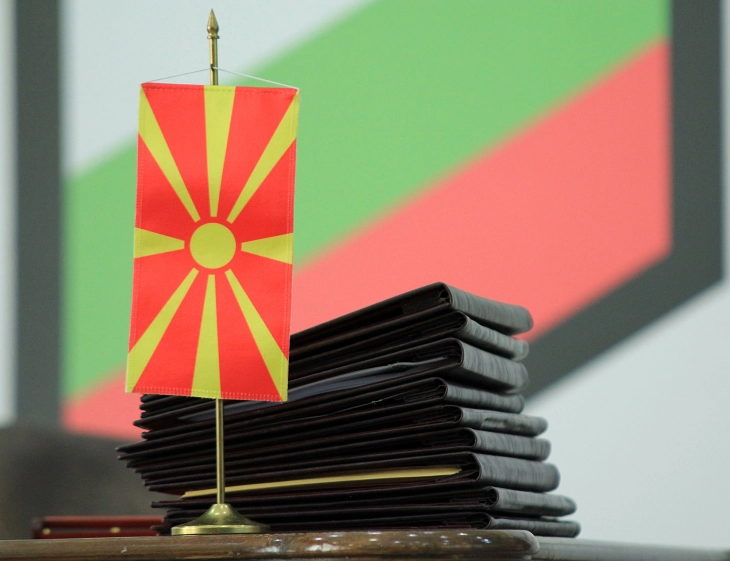IDSCS: Sofia has other conditions for conclusion of IGC, besides inclusion of Bulgarians within Constitution
- The inclusion of the Bulgarians within the Macedonian Constitution is not the only requirement for the opening of the Second Intergovernmental Conference (IGC), i.e., the first negotiating Cluster. With the signing of the second Protocol, the country accepted an obligation to fulfill a series of other tasks. Some of them clearly defined, while others raising dilemmas and requiring thorough analysis, such as the historical issues and hate speech, said the Institute for Democracy “Societas Civilis” Skopje (IDSCS) in its overview of some measures from the second meeting of the joint intergovernmental commission between North Macedonia and Bulgaria.
- Post By Angel Dimoski
- 14:27, 11 May, 2023

Skopje, 11 May 2023 (MIA) – The inclusion of the Bulgarians within the Macedonian Constitution is not the only requirement for the opening of the Second Intergovernmental Conference (IGC), i.e., the first negotiating Cluster. With the signing of the second Protocol, the country accepted an obligation to fulfill a series of other tasks. Some of them clearly defined, while others raising dilemmas and requiring thorough analysis, such as the historical issues and hate speech, said the Institute for Democracy “Societas Civilis” Skopje (IDSCS) in its overview of some measures from the second meeting of the joint intergovernmental commission between North Macedonia and Bulgaria.
The Institute stressed that transparency in the bilateral relations between the two countries favors North Macedonia and the country should insist on it.
“The Treaty with Bulgaria becomes a significant condition and criterion for the beginning of negotiations. Our interpretation and worry is that the inclusion of the Bulgarians within the Constitution is not the only criterion for the beginning of talks, but also a series of other measures accepted by the Government with the second Protocol, since there are measures that have to be undertaken before and after the beginning of talks,” said Marko Troshanovski from IDSCS.
Troshanovski added that the Action Plan which includes contents from the Protocol becomes a part of the roadmap for the rule of law. The contents refer to measures and mechanisms for tackling hate speech, malicious propaganda, the work of the joint commission on historical issues, educational issues etc.
“As we saw with the Pendikov case, the non-specific definitions of the tasks leave room for free interpretation from the Bulgarian side, our concern is that this could lead to conclusions that Macedonia is not implementing the measures, i.e., the Treaty,” Troshanovski assessed.
In the case with Pendikov, he added, despite all the measures taken by the Macedonian side, the Bulgarian Parliament adopted a declaration stating that the country is not committed to efficiently tackling violence and hate speech.
“This declaration could then be used as an argument by the Bulgarian Government to show that the Treaty is not being implemented and to refuse to allow the completion of the IGC,” said Troshanovski.

Troshanovski said that with the overview, the Institute wants to shine a light on the measures undertaken and point to what the Government should do in the coming period – to launch a debate, to develop procedures, “so that,” the Institute said, “we don’t end up in a situation in which documents, procedures and national positions are adopted in a hurry and without broad consultations, which reinforces the deep polarization in society.”
“Regarding hate speech, an urgent reaction from the Ministry of Foreign Affairs in coordination with the Ministry of Justice and the National Ombudsman, in order to begin talks with the EU Agency for Fundamental Rights, with the goal of using the Agency’s expertise for the establishment of a functional, comprehensive mechanism fully respecting all international norms and protecting the freedom of speech and thought is necessary,” stressed the Institute.
In this context, the Institute added, the Protocol also refers to the adoption of efficient measures for the prevention of malicious propaganda from institutions and agencies, and discouraging activities from private entities. The dilemma here, said the Institute, is the need to define non-malicious propaganda and responsibility for its identification.
“It is important to determine what these activities from private entities constitute, since these entities enjoy independence in their private and business activities. The ability to fulfill this task is further questioned by the inability of the state to control the actions of individuals, and it represents a constant threat for free interpretation and abuse by Bulgaria when it comes to assessment of the fulfillment of the tasks from the agreement. A typical example is the recent case with Pendikov,” added the Institute.
Photo: MIA Archive







